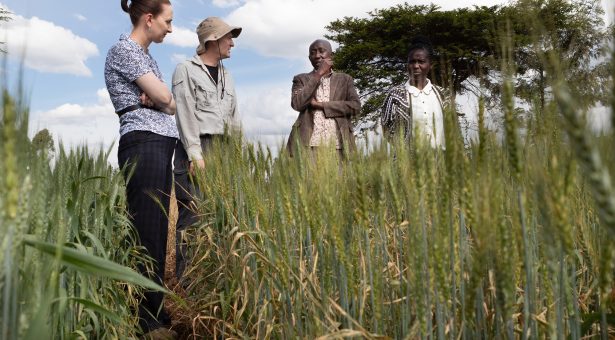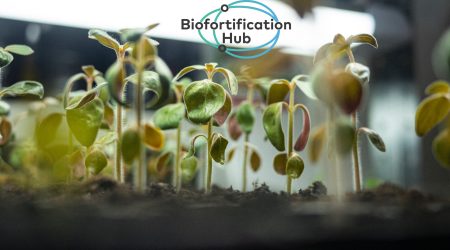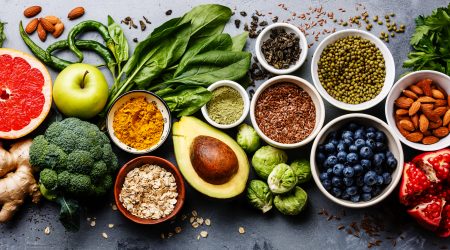Lead role for John Innes Centre as the UK’s first CGIAR Centre is launched by Rishi Sunak

The John Innes Centre will play a leading role in driving a global food security initiative announced by Prime Minister Rishi Sunak.
The UK Prime Minister announced the launch of the UK-CGIAR Centre at the Global Food Security Summit in London on November 20.
Hosted by the Bill & Melinda Gates Foundation and the Children’s Investment Fund Foundation, the event involved 200 representatives and partners from around the globe.
The Prime Minister said: “We are launching a new UK-CGIAR Science Centre to drive cutting edge research on flood tolerance rice, disease resistant wheat and much more. These innovations will reach millions across the poorest countries as well as improving UK crop yields and driving down food prices.”
The UK government wants to harness the country’s strengths in science and technology to help tackle the interconnected challenges of global food security and climate change.
With funding from FCDO, the UK-CGIAR Centre has been created to help Britain achieve this ambition by strengthening ties between CGIAR, the world’s largest global agricultural innovation network, and UK science.
UK scientific institutes have a long history of working with CGIAR, which include organisations such as ICARDA and CIMMYT, but these collaborations are dispersed and in need of refinement. The UK-Centre will be forging dynamic, new collaborations between CGIAR, UK science institutes and research centres in the Global South as well as galvanising existing partnerships.
The John Innes Centre has been selected as one of the UK leads for the UK-CGIAR, facilitating the already strong links between CGIAR and forging new partnerships.
As part of the initiative John Innes Centre researchers will help lead a project titled Leveraging genetic innovations for accelerated breeding of climate resilient and nutritious crops.
The focus is on developing locally adapted wheat crops with enhanced resistance to wheat rusts and with elevated levels of iron—an essential micronutrient for human health.
Increasing wheat yield is vital to meeting future worldwide food requirements. Given global population growth, wheat production needs to increase 60% by 2050 to meet global demand.
This project aims to help address this challenge by
- accelerating the breeding process and delivering higher genetic gain by adopting new breeding approaches such as genome editing,
- exploiting novel genetic variation in germplasm banks,
- and developing data-driven approaches to breeding.
The John Innes Centre will undertake its research activities in collaboration with ICARDA and CIMMYT alongside national partners in Kenya, Egypt, and Pakistan. These countries have all set goals of becoming self-sufficient in wheat production and this project aligns closely with these aims.
Professor Cristobal Uauy, Professor Janneke Balk and Professor Diane Saunders, group leaders at the John Innes Centre, will lead our commitment to the project.
“The new CGIAR project aims to accelerate the wheat breeding process by incorporating recent discoveries and embracing innovative breeding techniques, such as precision breeding (genome editing) and data-driven sequence-based discovery. It is about facilitating adoption of technology, building on years of collaboration among partners and focussing our innovations oin farmer-preferred wheat cultivars,” said Professor Uauy.
UK CGIAR Centre will operate as a virtual hub. Day-to-day operations will be managed by CABI which will direct the Centre’s secretariat liaising between the core members of the Centre: FCDO, CGIAR, BBSRC (representing UKRI). Its roles will also involve relationship management with existing and prospective partners, communications support, project commissioning, as well as monitoring, evaluation, and reporting.
The Centre has already commissioned research and started forging partnerships that will work on four areas:
- Confronting climate change and environmental degradation through sustainable crop management and climate-smart agronomic practices
- Crop genetic improvement for future climate resilience
- Enhancing nutrition
- Livestock improvement, animal health, nutrition and welfare
The researchers on the projects will be working in FCDO “priority regions,” including Africa and South Asia. Through these partnerships, the Centre aims improve to locally led innovation and encourage the exchange of agriculture expertise.
The project will run for three years, and it is envisioned to continue beyond the initial phase.
Professor Lindiwe Majele Sibanda, Chair of the CGIAR System Board said: “I’m delighted to witness the launch of this initiative. This is an excellent opportunity to strengthen CGIAR’s existing ties with the UK’s leading scientific institutes and forge new partnerships. The partnership will aid access to cutting edge research ideas for innovations that will benefit the developing countries in which we work.”
A Senior CABI spokesperson said: “CABI has a long history of working with the FCDO and acting as a home for ambitious new projects that produce cutting edge research. We are delighted to be working more closely with CGIAR and several leading UK scientific institutes to understand and help address the growing challenge of global food security. CABI looks forward to a long and fruitful collaboration.”
Who the John Innes Centre will be working with
The John Innes Centre, ICARDA and CIMMYT have long-standing ties with its partners in the countries where the research will be conducted. In Kenya, the John Innes Centre will be working with CIMMYT and KALRO-Njoro. The John Innes Centre worked with these partners through the Wheat Disease Early Warning Advisory System (Wheat DEWAS) project, an FCDO/BMGF funded initiative. The John Innes Centre also worked closely with KALRO and wider NARES on Bioinformatics Community of Practice.
In Pakistan, Quaid-i-Azam University (QAU) Islamabad and JIC worked together to develop the high iron genome edited lines. The CGIAR centres and John Innes Centre have a long-standing strategic partnership which has included years of germplasm exchange and multiple joint projects, such as the International Wheat Yield Partnership. As a result of this collaboration, the John Innes Centre can now generate genome edited lines directly in CGIAR wheat varieties, such as Borlaug100, Zincol, and Omrabi5. This unique expertise allows timely editing directly in target country relevant germplasm.
John Innes Centre and ARC-Egypt have previously worked together on wheat genetics and provided training on genomics. ICARDA and the Agricultural Research Center (ARC) established the Wheat Improvement Program in 2009 to improve germplasm, enhance crop management, and strengthen Egypt’s national capacity in wheat production. CIMMYT and QAU coordinate work through the university’s Dr. Awais Rasheed, who is also an Associate Researcher with CIMMYT.
John Innes Centre will generate transgene-free genome edited lines, evaluate their performance in glasshouse and share the findings with partners. Targeting Induced Local Lesions in Genomes (TILLING) mutants and genome edited lines will be evaluated for wheat rust resistance in Kenya (by KALRO and CIMMYT) and Egypt (by ARC and ICARDA). Genome edited lines for high iron will be tested in Pakistan by QAU and partners in Kenya and Egypt. ICARDA and CIMMYT will work with John Innes Centre on big-data analytics and whole-genome analyses. All partners will work together on training and communication.



